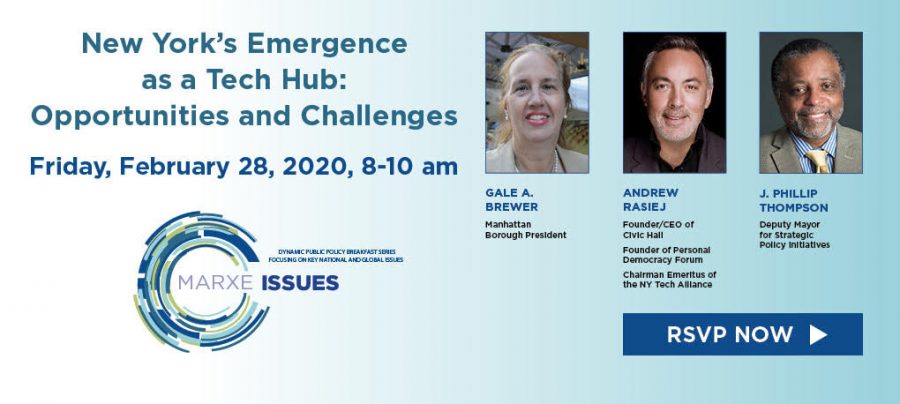Together, they discussed with Birdsell what New York has accomplished in becoming a tech hub and what steps must be taken in order for it to rival California’s Silicon Valley in the future.
All of the panelists agreed that New York has yet to reach its potential and that a greater emphasis on careers in tech can be valuable for students.
Brewer mentioned that 85% of companies want to increase the hiring of new talent, though not all of these companies feel the talent available to them is that which they need most.
Thompson claimed that New York has not reached its maximum potential and that a collective mindset change is necessary for development.
The panelists also agreed that CUNY students should have a major role in New York’s emergence as a tech hub.
Rasiej mentioned that the lack of diversity within the tech industry is dangerous, as it can result in the proliferation of products harmful to minority communities.
However, CUNY’s diverse student body can contribute unique perspectives and ideas to companies looking to create products that can serve all communities.
There is especially a lack of black and Latinx representation in the tech industry that must change in order to develop products and services that work for everyone.
Thompson and Rasiej stressed the importance of considering diverse opinions as essential, stating that people who grew up in low-income households are best suited to create solutions to problems that low-income families deal with.
Panelists stress that there is a need for more support for CUNY and minority students hoping to go into tech. Brewer, who teaches at Hunter College, recognized the need for additional funding in many areas within CUNY.
Underserved communities must be accounted for while the city makes progress in tech, according to the panelists, all of whom believe that access to free or low-cost internet for minority youths is of utmost importance.
Brewer, Thompson and Rasiej each mentioned that not enough low-income households have access to free internet at home and that students are failing to reach their maximum potential because of this fact. Minorities face additional challenges in the tech sector.
Thompson brought up the difficulties that people of color face when attempting to secure financing for their companies and the harmful effects of racial bias while fundraising.
For New York to be best positioned as a tech hub, the panelists stated the importance of establishing a comprehensive framework for promoting innovation.
“Every single company is a tech company,” Rasiej said. “We don’t have a tech sector, we have a tech ecosystem.”
Thompson talked about his time at the Massachusetts Institute of Technology, and how he witnessed professors conduct research at the university and apply their findings to their businesses headquartered within the same neighborhood.
He claimed that the city needs to create a coherent strategy with CUNY in order to create a space for innovation and enable companies to take interest in the work of students.
Rasiej agreed, citing the collaborative work center Civic Hall, which he founded, and the development of its newest, in-progress center Civic Hall @ Union Square as a possible model for institutions everywhere to copy.








